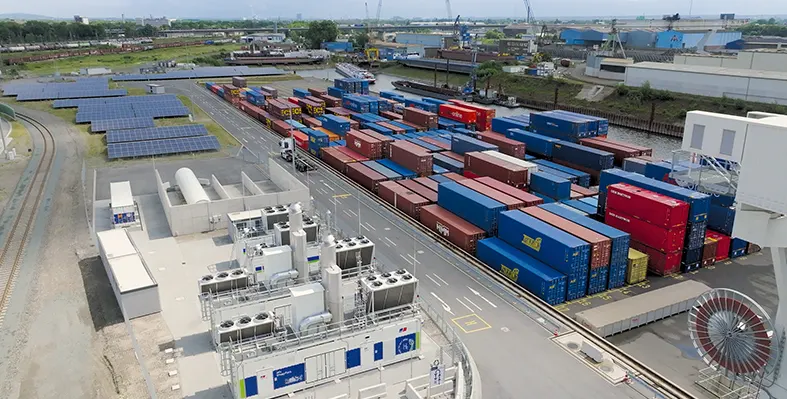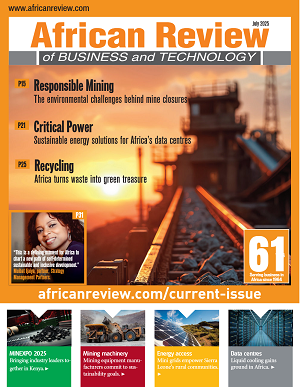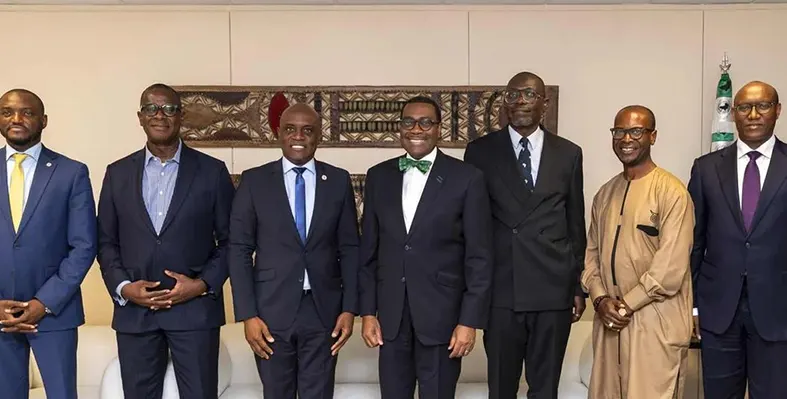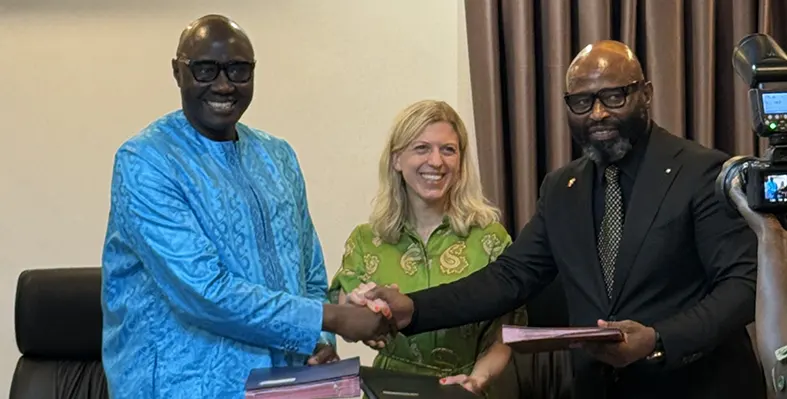Test Article
In The Spotlight
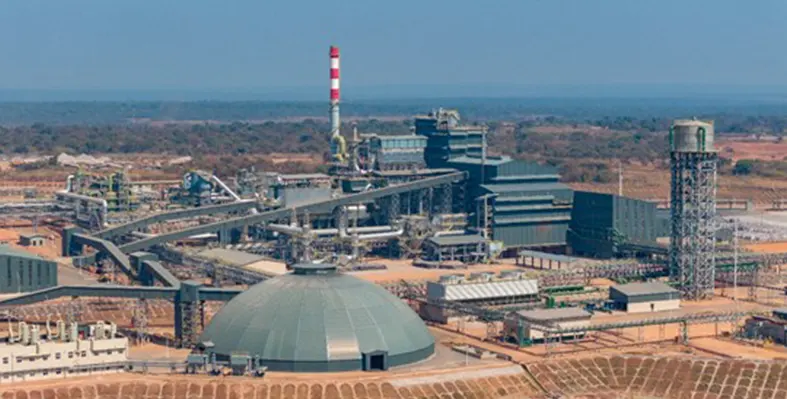
The heat-up of Kamoa-Kakula’s state-of-the-art, 500,000-tonne-per-annum direct-to-blister copper smelter is expected to start in September 2025. (Image source: Ivanhoe Mines)
Ivanhoe Mines has released its production results for the second quarter of 2025, along with updates on its operational and project activities
During Q2, the Kamoa-Kakula Phase 1, 2, and 3 concentrators processed 3.62 million tonnes of ore, resulting in 112,009 tonnes of copper output — an 11% increase compared to the same period last year.
The company confirmed that 'Stage One' dewatering measures have been operating according to plan since June 2, 2025. Water levels on the eastern side of the Kakula Mine have started to fall ahead of the 'Stage Two' dewatering phase, scheduled to begin next month. Five high-capacity submersible pumps, currently being assembled in China, are expected to be delivered to site soon.
Mining on the western side of the Kakula Mine resumed in early June. By mid-month, the mining rate reached 300,000 tonnes per month, with copper grades ranging between 3% and 4%.
Consequently, since mid-June, the Phase 1 and 2 concentrators have ramped up to a combined processing rate of 670,000 tonnes per month, equivalent to 8 million tonnes per year.
Ivanhoe also confirmed that underground development of a new mining area on the far eastern side of the Kakula Mine has commenced. Two new access drives are being developed from existing underground infrastructure.
Founder and co-chairman Robert Friedland praised the company’s teams and provided an in-depth outlook: “We commend the hard work and dedication of our management team, mining and engineering crews at Kamoa-Kakula, who continue to work tirelessly to turn around operations at Kakula.
“Operational recovery plans are well underway at Kamoa-Kakula following the decisive and proactive actions undertaken by management in response to the seismic activity first announced on May 20. Safety of our employees and contractors remains our top priority at Kamoa-Kakula and we are now systematically and judiciously increasing development activities to increase the supply of high-grade, fresh ore to the Phase 1 and Phase 2 concentrators from mining areas on the western side of the Kakula ore body. We expect to return to mining areas grading approximately 5% copper on the western side of Kakula towards the end of the year, which will drive a further improvement in operating results and efficiency.
“Meanwhile, we have commenced development towards a new high-grade mining area on the far eastern side of Kakula, which is expected to provide additional high-grade ore by Q2 2026. We also expect to transport excess ore from the Kamoa and Kansoko mines, which continue to outperform on all metrics, to further augment feed of fresh material to the Phase 1 and Phase 2 concentrators as soon as possible.
“Dewatering efforts of the Kakula Mine are proceeding to plan, which will provide us access to assess additional high-grade ore from the affected workings that can be safely mined to feed the Phase 1 and Phase 2 concentrators.
“We also commend our management team at Kipushi for a strong quarterly operating performance. Kipushi is now well on track as one of the world’s largest, highest-grade, and greenest major zinc mines. Lastly, but certainly not least, we are extremely excited for first production at Platreef later this year which will set the stage for a phased expansion that is set to position the operation as the world’s largest, and lowest-cost producer of platinum-group metals, nickel, copper, and gold. Given the current rally in platinum-group metals prices and the rising interest in these metals, we firmly believe Platreef is positioned to emerge at the right moment in the cycle to deliver exceptional returns for our shareholders.”
Also read: Ivanhoe Mines reports strong Q1 progress
As Mali’s flagship Bougouni lithium project gears up for its first exports, the mine’s diesel power plant is being put to work
In January, London-listed developer Kodal Minerals announced that the thermal power generation facility was now operational, paving the way for commissioning of the stage 1 Dense Media Separation (DMS) processing plant.
The project is being heavily funded by Hainan Mining, a subsidiary of Chinese investment conglomerate, Fosun International, which is listed on the Hong Kong Stock Exchange.
The power plant itself is 100% diesel, with the mine site operations drawing around 3MW continuous power from six 1000kW, Cummins KTA50-G3 installed units.
In the company’s annual report for the year ended 31 March 2024, Kodal Minerals stated that with the absence of reticulated power in the Bougouni region, a 5MW diesel power plant was procured from Jiangsu Fukangsi in China, comprising Cummins engines.
“The power solution will include in its design the installation of complementary solar power, however due to the short time frame for project construction the solar circuit will be deferred into the future; likely after 12 months of operation,” the report notes.
The generators arrived on site in southern Mali in mid-December 2024, with the project team moving swiftly to complete the installation, cabling and testing of the equipment to achieve first power by late January 2025.
At the time, Bernard Aylward, CEO of Kodal Minerals, commended his site team, noting that they had “performed fantastically to successfully finish the installation of the power generation plant and achieve the important ‘Power-On’ milestone at Bougouni.”
He added that piping and electrical cabling continued to advance, ahead the commissioning of the DMS processing plant.
In the company’s most recent update, on 30 June, Kodal Minerals announced that an off-take agreement for the spodumene concentrate produced by the stage 1 DMS plant had been signed between its local subsidiary, Les Mines de Lithium de Bougouni, and Hainan Mining, the exclusive buyer for a period of four years.
Aylward also added that discussions with the Mali government to secure the export permit for the spodumene concentrate were continuing.
The export of the spodumene, an important source of lithium, will take place via the Port of Abidjan in Côte d'Ivoire, before final export on to China.
Read more:
Cooper LPG gensets bound for Africa market

ENGIE completes Africa’s largest wind project ahead of schedule in Egypt’s Ras Ghareb. (Image source: ENGIE)
ENGIE has officially announced the full commissioning of the Red Sea Wind Energy wind farm in Ras Ghareb, Egypt. With a total installed capacity of 650 MW, it now stands as the largest operational wind farm in the Middle East and Africa
This significant milestone follows the completion of a 150MW expansion, delivered four months ahead of schedule. The expansion increased the total capacity from 500MW to 650MW. The project progressed through several commissioning phases: 306MW came online in December 2024, followed by 194MW in April 2025, and the final 150MW in June 2025. Initially slated for the third quarter of 2025, the grid connection of the entire 650MW capacity was successfully achieved by June 2025.
The Red Sea Wind Energy project is also notable for its health and safety standards, having completed 7 million hours of work without a lost time injury. Once fully operational, the wind farm is expected to supply renewable electricity to over one million homes, reducing carbon emissions by approximately 1.3 million tons annually.
A 25-year power purchase agreement (PPA) has been signed with the Egyptian Electricity Transmission Company (EETC), ensuring long-term revenue stability for the project.
The development was led by the Red Sea Wind Energy consortium, comprising ENGIE (35%), Orascom Construction PLC (25%), Toyota Tsusho Corporation (20%), and Eurus Energy Holdings Corporation (20%). Financing was arranged through the Japan Bank for International Corporation (JBIC), with coordination from Sumitomo Mitsui Banking Corporation, the Norinchukin Bank, Société Générale S.A, under a Nippon Export and Investment Insurance (NEXI) cover, and the European Bank for Reconstruction and Development (EBRD).
Paulo Almirante, ENGIE executive vice-president in charge of renewable & flexible power, stated, "This achievement demonstrates our Group's industrial performance and our ability to develop large-scale renewable projects in record time. It also illustrates the strength of our consortium and its contribution to decarbonizing Egypt's energy mix. With the commissioning of Red Sea Wind Energy, ENGIE now operates nearly 1GW of wind power capacity in Egypt, consolidating our position as a leader in the renewable energy sector in Africa and the Middle East."
ENGIE is also advancing plans for a new wind farm exceeding 900 MW near the Red Sea Wind Energy site, continuing its development efforts with the same consortium.
-

-

In the final webinar of its African Review-hosted 2023 campaign, Convergent Group explored its modern, eco-friendly concrete solutions for African projects
Such solutions – delivered to cut maintenance costs by eliminating hazardous silicate products – were showcased by company experts in the form of Jean-Claude Biard, SEO of Convergent Group SA; Mputu Schmidt, former CEO of Convergent Group SA and founder of Bondeko MB (exclusive distributor of Convergent Group in Africa); Carlos Garcia, technical and sales for ADI Group (Spanish distributor for Convergent Group); and Amritpal Singh Sura, external consultant for flooring treatments, former distributor of Convergent products in the Middle East.
“A number of projects we were doing in the Middle East required protection,” remarked Sura. “Longevity of protection requires a system which basically impregnates and becomes a densified surface as opposed to something which is topical and lifts off due to moisture migration. I found that being exposed to Convergent, it was important to stay focused on those systems in the Middle East. Jean-Claude, Mputu and I met several times in Dubai and there was emphasis on providing systems which were affordable and still ending up having a robust, lasting longevity of product. So you are not spending money all the time in order to maintain the finishes which you have already paid for.”
Over the course of the session, the participants guided the audience through the potential of cutting-edge lithium silicate technology for enhancing the protection of concrete surfaces, maximising cost-effectiveness and meeting sustainability targets.
-

In a comprehensive webinar hosted by African Review, a panel of professionals associated with Convergent Group explored new generation lithium silicate technology and why it is emerging as the optimum solution for concrete floor protection.
Robert Daniels, editor of African Review, was joined by Jean-Claude Biard, CEO of Convergent Group; Mputu Schmidt, former CEO of Convergent and founder of Bondeko MB, an exclusive distributor of Convergent; Hicham Sofyani, president of Texol; Carlos Garcia, technical and sales for ADI Group; and Marc Puig, commercial manager of Comace Import.
Each providing a unique angle, the panellists combined to provide a masterclass around concrete treatments and the increasing challenges around them, explaining to attendees how to choose the right formula for their requirements and touching on issues such as why lithium densifiers are better than sodium and potassium densifiers.
Throughout the session, those watching were treated to informative case studies showcasing how Convergent eco-friendly products are increasing abrasion resistance, raising ease of maintenance, and ensuring the highest quality gloss retention.
By the end of the webinar, a majority of attendees (many of which had not had much experience with Convergent) expressed their interest in using the company’s new generation lithium silicate technology with the rest indicating their desire to learn more about Convergent and its products. Watch the webinar, in full, to discover why viewers were convinced and learn more about advanced floor care solutions for your operations.
-

Presenting on an African Review-hosted webinar, Martin Provencher, global industry principal for mining, metals and materials at AVEVA, explored the digital transformation of mining operations and its impact on sustainability.
“Sustainability is becoming a key aspect for mining operations,” remarked Provencher. “If we look at the latest EY research on the top ten business risks and opportunities for mining and metals globally in 2023, ESG remains at the top. Of course, most companies have environmental goals or are expected to reach a net zero emission by 2050, which is a pretty aggressive target. Many of them are targeting 30% reduction by 2030; seven years from now. So there is a lot of action that needs to take place quickly to get there. It is possible to get there, but we need to make sure we are doing this correctly.”
Fast becoming a huge part of ESG initiatives is fleet electrification where particular progress is being made in underground mines. While some countries are certainly more advanced than others here, Provencher noted that 40% of total emissions from the mining industry come from diesel trucks, making EVs a very attractive low-hanging fruit for companies to pursue.
There are, however, a number of challenges associated with bringing in electric vehicles which remains a barrier for introduction. One of the predominant reasons, is the limited range of EVs against diesel counterparts. To mitigate this, Provencher continued, data management is key and ensuring a strong grasp of real-time information coming in will show operators when machinery needs to be charged, allowing them to plan effectively for maximum efficiency on site.
Indeed, this is but a small advantage that digitalisation can bring to the mining industry as it grapples to meet ESG goals while achieving production targets. By getting a better grip of their data and using it to empower tools such as artificial intelligence, advanced analytics and machine learning, companies can achieve tangible benefits such as reduce downtime, enhance worker safety, cut operating costs and, of course, ensure compliance with environmental regulations and targets.
Through the course of the webinar, Provencher outlined this in more detail and explored AVEVA’s suite of cutting-edge software solutions, specifically designed to help mining companies make progress on their digitalisation journey and empower their operations.
Watch the full webinar, completed with detailed case studies and an insightful Q&A session.
-

-

-

Convergent, in association with African Review, has held a detailed webinar exploring the usage and effectiveness of lithium silicates and densifiers over traditional methods of concrete surface management which often struggle to meet the increasing challenges posed by concrete surface management.
Convergent experts including Mputu Schmidt, CEO of Convergent; Carlos Garcia, product manager end-user solutions, construction chemicals, Spain and Portugal for the RD Group; Matteo Mozzarelli, CEO of concrete Solutions Italia; and Jean-Claude Biard, global senior executive for the Convergent Group, presented across the session.
Together, they delved into the latest cost-effective application methods for long lasting finishing of concrete that can help reduce maintenance costs and avoid unexpected repair action. In addition, they examined the advancements in technologies that can sustain increased abrasion resistant stains and ensure gloss retention to the highest quality.
As part of the webinar, the representatives explored case studies including a case in DRC where a medical centre had been constructed with a low-quality concrete floor. The customer was considering completely replacing the floor but instead, Convergent put forward a special treatment with its 244+ Pentra-Sil lithium hardener, densifier and sealer. With this solution, Convergent can increase the hardness of a surface by up to 40% and therefore saved the customer significant recuperation costs over a complete replacement. Convergent were happy to report that the solution was perfect for the facility and the customer was pleased to avoid the extra construction work that would have been required for a complete replacement.
Watch the full webinar, including more information about Convergent’s innovative solutions.
The African Development Bank (AfDB) has approved €173.84mn (US$201mn) in additional funding in support of electrification efforts in Rwanda
AfDB said in a statement that the goal of its Rwanda Energy Sector Result-Based Financing (RBF II) programme is to modernise the country’s electricity network, expand access to clean energy and strengthen institutional capacity.
In addition, the Asian Infrastructure Investment Bank will also provide a further €86.92mn (US$101mn), bringing the total programme cost to €260.76mn (US$302mn).
RBF II is anchored on Rwanda’s Energy Sector Strategic Plan 2024–2029, which aims to improve the quality of life of residents, drive economic growth and reduce poverty through targeted energy sector investments, the AfDB noted.
Specifically, it added, the new programme is focused on delivering results in three areas: modernising and extending the electricity network and systems; increasing access to on-grid and off-grid electricity and clean cooking technologies; and strengthening technical and institutional capacity.
It will connect 200,000 households and 850 productive use customers to the national grid, add 50,000 new electricity connections through off-grid solutions, provide clean cooking devices to 100,000 households and 310 public institutions, and install street lighting on 200 km of roads in secondary cities across Rwanda.
AfDB added that the RBF II programme forms part of the bank’s High-5 priority areas of ‘Light up and Power Africa’ and ‘Improve the Quality of Life of the People of Africa’.
Additionally, it will contribute to delivering on the Mission 300 Initiative of the African Development Bank and the World Bank to connect 300 million Africans to electricity by 2030, it noted.
Read more:
Burundi's Jiji hydro power plant opened
AfDB supports Kigali's first urban cable car project
As Nigeria’s Hitech Construction Company Limited nears completion on the first segment of the Lagos-Calabar Coastal Highway, the project has secured a landmark financing package involving commercial and other lenders that bodes well for future infrastructure developments
Deutsche Bank led a US$747mn syndicated loan to fund the first section of the project, which covers a 47-km stretch from Victoria Island to Eleko Village in Lagos.
A statement by Nigeria’s Ministry of Finance said it marks the largest syndicated loan ever arranged for a roads project in the country and reflects a “strong signal of global investor confidence” in the nation’s reform trajectory and infrastructure pipeline.
The Lagos-Calabar Coastal Highway is a flagship project under Nigeria’s Renewed Hope Infrastructure Development Agenda.
“This deal reflects the success of our macroeconomic reforms and the return of international capital to support Nigeria’s development,” said Wale Edun, Minister of Finance and Coordinating Minister of the Economy.
“We are focused on financing infrastructure in ways that are sustainable, transparent and catalytic — and this transaction is a model of that vision.”
Deutsche Bank acted as the transaction’s global coordinator, lead arranger and bookrunner and participated in the syndicate, alongside other regional and international lenders.
The syndicate includes support from development finance institutions, export credit agencies and international commercial banks, such as First Abu Dhabi Bank, the African Export-Import Bank (Afrexim), the Abu Dhabi Exports Office (ADEX), ECOWAS Bank for Investment and Development, Nexent Bank N.V. (formerly known as Credit Europe Bank N.V.) and Zenith Bank (through its UK, Paris and Nigeria offices).
The Islamic Corporation for the Insurance of Investment and Export Credit (ICIEC), a part of the Islamic Development Bank Group, provided partial political and commercial risk insurance.
The project is structured as an EPC+F (Engineering, Procurement, Construction + Financing) contract awarded to Hitech Construction, one of Nigeria’s leading infrastructure firms.
The highway, which is being built using Continuously Reinforced Concrete Pavement (CRCP), also reflects a commitment to longer-term resilience and efficiency, engineered for a minimum lifespan of 50 years with minimal maintenance.
Construction of Phase 1 Section 1 is already over 70% complete, said Dany Abboud, Hitech Construction’s managing director.
“We are proud to deliver this historic project,” he said. “We are showing that Nigerian engineering — backed by structured international finance— can meet global standards. The use of CRCP technology ensures unmatched durability and cost-efficiency.”
The highway will serve as a vital trade and logistics corridor for Nigeria, enhancing regional integration, tourism, reducing transport costs and creating jobs.
A tolling strategy is currently being finalised to ensure the project’s operational and financial sustainability, while additional funding for subsequent phases is now being structured, reportedly with strong interest from regional and international investors, according to the Ministry of Finance.
“This transaction is a vote of confidence in Nigeria’s economic reform agenda,” said David Umahi, Nigeria’s Minister of Works.
“The Lagos-Calabar Highway is a strategic national asset, and this financing sets a strong precedent for future public-private infrastructure partnerships.”
Read more:
African Development Bank targets Nigeria's infrastructure
Nigeria begins work on Cross Rivers agro-industrial zone
Transnet SOC Ltd and United Manganese of Kalahari (UMK) have signed a 10-year agreement for transporting manganese by rail from UMK’s Northern Cape mine to export ports
The deal falls under the Manganese Export Capacity Allocation (MECA) 3 framework, through which Transnet allocates rail and port capacity to South African manganese producers. The long-term commitment reflects UMK’s confidence in Transnet’s capability to support access to global markets efficiently.
Transnet group CEO, Michelle Phillips, said, “We are encouraged by the vote of confidence expressed by UMK through their long-term commitment as part of the MECA programme. This agreement is a clear demonstration of our customers’ confidence in the efficiency and reliability of our services. It also bodes well for Transnet’s growth and sustainability, which is underpinned by our ambitious Reinvent for Growth Strategy amid various reform initiatives within the freight logistics sector.”
UMK CEO, Malcolm Curror, emphasised the importance of reliable rail freight, “By enabling the efficient movement of bulk commodities such as manganese, MECA not only positively adds to our national export capability but also to a greater competitive revitalisation of the country’s logistics network.”
He added that this efficiency is vital for sustaining economic growth and encouraging investment across sectors.
Curror also noted, “The MECA agreement holds significant and broader relevance to current national dialogue regarding the mining sector in South Africa.”
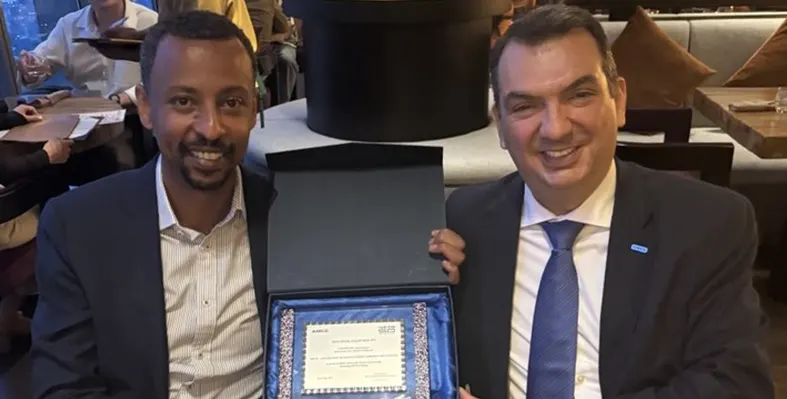
Dr Brook Taye (left), CEO of EIH, pictured with Shahram Falati, IVECO’s business director for Africa & Middle East. (Image source: IVECO)
This year, IVECO and AMCE celebrate 50 years partnership driving Ethiopia’s automotive sector
AMCE (Automotive Manufacturing Company of Ethiopia), a portfolio company of Ethiopian Investment Holdings (EIH), teamed up with global automotive leader IVECO in 1975, a collaboration that has played a defining role in Ethiopia’s transport and industrial development.
Established in 1970 and entering a joint venture with FIAT/IVECO shortly thereafter, AMCE has now assembled and delivered more than 30,000 IVECO commercial vehicles over five decades including the iconic 682N3 trucks, Trakker, IVECO T-Way, Leoncino buses, and specialized trailers built to serve Ethiopia’s growing logistics and public service sectors.
“For 50 years, AMCE and IVECO have worked hand-in-hand to deliver durable, reliable, and locally assembled vehicles that move Ethiopia forward,” said Antonio Caruso, AMCE general manager.
“We are proud of the legacy we’ve built together and look forward to continuing this journey of innovation and partnership.”
Founded in 1970, AMCE operates under a joint venture structure, with 70% ownership by IVECO and 30% by the Ethiopian government through EIH.
The impact of the AMCE and IVECO partnership extends far beyond assembly lines, however.
It has enabled technology and skills transfer across Ethiopia’s industrial ecosystem, spurring the growth of local manufacturers.
The after-sales and maintenance sector has similarly benefited, with technical expertise shared with workshops and service providers from Adama to Bahir Dar.
AMCE’s spare parts dealers throughout the country also allow IVECO customers access to genuine parts.
As Ethiopia continues to prioritise industrialisation and logistics modernisation, IVECO and AMCE remain committed to supporting these national priorities through advanced vehicle solutions, workforce training and local value creation.
“AMCE stands as a model of how joint ventures can deliver long-term economic and social value for Ethiopia,” said Dr Brook Taye, CEO of EIH.
“This partnership has been instrumental in strengthening Ethiopia’s automotive capacity and driving sustainable industrial growth.”
He added: “The next phase of our partnership will focus on addressing the logistics sector constraints in partnership with our portfolio companies and the private sector and introducing a wide range of IVECO’s electric vehicle options to the Ethiopian market.”
Read more:
Daimler Truck vehicle assembly plant in Senegal
A boost for South African automotive manufacturing
IVECO embraces change in product and services renewal
IVECO partners with Al-Imtiyazgroup to expand presence in Libya
South Africa has entered into a US$1.5bn loan agreement with the World Bank to support the revitalisation of its transport and energy infrastructure and stimulate economic recovery, the National Treasury announced recently
For over ten years, Africa’s most industrialised economy has faced stagnation, hindered by ongoing power outages that have reduced productivity and deteriorating rail systems and port congestion that have impacted key industries like mining and automotive manufacturing.
The government expects the loan to help alleviate transport constraints and bolster energy security, although it has not disclosed which specific projects the World Bank funds will support.
The loan is expected to help manage the country’s rising debt-service burden by offering more favourable conditions than those available in commercial markets, including a three-year grace period.
State-run utilities Eskom and Transnet, responsible for energy and transport respectively, have faced long-standing operational and financial difficulties, contributing to the country’s sluggish growth, which stood at only 0.1% in the first quarter.
The Treasury stated that the interest rate on the 16-year loan from the World Bank is the six-month Secured Overnight Financing Rate plus 1.49%.
This facility is distinct from another US$500mn in funding that the World Bank Group is considering to help mobilise private investment in South Africa’s electricity transmission infrastructure, which needs to be expanded to accommodate more renewable energy projects.
Last month, Finance Minister Enoch Godongwana outlined a budget that includes over 1 trillion rand (US$55.5bn) in investment across sectors including transport, energy, water and sanitation, aimed at driving growth and improving public services.
It aimed for public debt to peak at 77.4% of gross domestic product in the current fiscal year, slowly declining after that.
Jumia, Africa’s leading e-commerce platform, has taken a significant step in reinforcing its presence in Egypt with the inauguration of a new integrated warehouse on Suez Road, Cairo
This development marks one of Jumia’s largest investments in the country and demonstrates its continued confidence in Egypt’s strategic role in Africa’s economic and logistical landscape.
Spanning over 27,000 sq m, the new facility is designed to optimise Jumia’s logistics capabilities by improving storage efficiency and speeding up deliveries, particularly to Upper Egypt. The warehouse is equipped with advanced smart systems that enhance order processing and customer satisfaction. As a key component of Jumia’s logistics infrastructure, the centre supports the company’s future expansion and aims to better serve merchants and consumers across the country.
This investment aligns with Jumia’s mission to boost Egypt’s digital economy and enhance its service offerings. It will also provide tailored logistics solutions for local manufacturers and merchants, reinforcing the platform’s support for domestic production.
The warehouse is projected to generate up to 10,000 direct and indirect jobs over the coming years, solidifying Jumia’s contribution to national economic development and youth empowerment.
Prime minister Dr Mostafa Madbouly commended the initiative, remarked, "We welcome this move by Jumia, which reflects the trust that major global companies have in Egypt’s investment climate. We look forward to more partnerships that support the state's goals in digital transformation, the development of logistics infrastructure, and the provision of job opportunities for Egyptian youth."
Abdel Latif Olama, CEO of Jumia Egypt, expressed his appreciation for the government’s support, stated, "We are proud of this achievement, which reflects Jumia’s long-term investment commitment in Egypt. We view Egypt as a strategic hub for our operations in the region. This warehouse represents a qualitative leap in the level of services we provide to our customers and partners, and it supports our vision of becoming an integrated platform that combines technology and logistics across the continent. It will also contribute to our growth in the Egyptian market."
Egypt also plays a critical role in Jumia’s tech ecosystem, hosting one of its largest technology hubs on the continent. This centre is home to a skilled team of engineers and developers who are building digital tools and logistics solutions to support operations across Africa.
During the inauguration, Olama delivered a presentation detailing Jumia’s impact in both Egypt and broader African markets. He also outlined plans for future expansion, reaffirming Egypt’s strategic importance to the company.
The launch of this facility is part of Jumia’s wider expansion strategy aimed at strengthening its infrastructure across Africa. Similar logistics centre s have already been established in Nigeria, Ghana, Ivory Coast, and Morocco, reinforcing the company’s role in advancing digital commerce and economic development across the continent.








